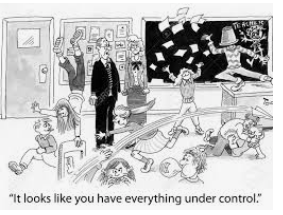Teaching can be the greatest job on earth but it can also be tough. Sixteen years ago I was thrown out of teaching for exposing what I judged to be the unhappy and desperate measures teachers resorted to in order to establish order in the classroom. I have been teaching, training and writing about the psychology of learning relationships ever since because I believe teachers need more help than they are currently getting.
 To lose control of a classroom is a feeling of absolute vulnerability, of being inside out with nowhere to hide! Worse still is to look at the clock and see that you have 50 minutes of the lesson left and know that you have run out of ideas. I know. I’ve been there. And if that feeling of desperation is what has brought you here, then welcome. You are not a failure, you are just a human dealing with the mechanisms of how we are programmed to resist the unknown. If you can get through this then you will be a great teacher.
To lose control of a classroom is a feeling of absolute vulnerability, of being inside out with nowhere to hide! Worse still is to look at the clock and see that you have 50 minutes of the lesson left and know that you have run out of ideas. I know. I’ve been there. And if that feeling of desperation is what has brought you here, then welcome. You are not a failure, you are just a human dealing with the mechanisms of how we are programmed to resist the unknown. If you can get through this then you will be a great teacher.
One of the earworms that get into a teachers heads when they feel anxious about  teaching a new class is that they just don’t know enough. Teaching is an anxious business, especially when you begin and many teachers go into classes with higher levels of fear the they are used to dealing with in their every day lives. You are being brave enough to take a place at the front of a classroom and lead learning for young people, some of whom are resistant or downright hostile. Whenever I tell people that I have been teacher in UK state secondary schools, they tip their metaphoric hat and shake their head as though I have told them I have just returned from a war zone.
teaching a new class is that they just don’t know enough. Teaching is an anxious business, especially when you begin and many teachers go into classes with higher levels of fear the they are used to dealing with in their every day lives. You are being brave enough to take a place at the front of a classroom and lead learning for young people, some of whom are resistant or downright hostile. Whenever I tell people that I have been teacher in UK state secondary schools, they tip their metaphoric hat and shake their head as though I have told them I have just returned from a war zone.
For me, the earworm went something like:
The students will know more than me – I don’t know enough – I’m a fraud and they’ll see through me….and chaos will ensue.
In my experience as a teacher and school leader, I recognise that new teachers pile enormous pressure on themselves by having expectations that they can never meet.
Do you expect to know ‘everything’ about what you are teaching?
Do you expect to know ‘everything’ about what you are teaching? There might be an expectation that you have to be an ‘expert’. Every teacher needs to feel as though they know what we are talking and teaching about and it’s very important that students sense that you know your subject. However, this is different from placing an expectation on yourself that you know more than everyone else about everything else, whether it’s your subject or not.
Actually, it is not your role to know everything. It is possibly not even your role to teach the students in front of you what you know.
Actually, it is not your role to know everything. It is possibly not even your role to teach the students in front of you what you know. The best teaching helps students draw on what they already know or understand and apply that to the new learning you are presenting them with. It is a step by step process. Teaching is a two way street where you are confident about your subject but where you also accept that you do not know everything AND that is not your job to know everything.
Don’t confuse this with not preparing your lessons appropriately…
If you are going to teach a group of students about punctuation, it is probably a good idea to learn about punctuation first. You need enough subject knowledge to be thorough, considering the context of the whole subject and given the limits of the pupils in front of you. It is your role to help them to think for themselves after all.
one of the greatest joys of teaching is that you continue to learn.
Also, one of the greatest joys of teaching is that you continue to learn. It is your ability to learn and demonstrate an enthusiasm for the process of learning that is as important as being the expert. You will have to learn new topics or new syllabi. Relish learning and your ability to step confidently into the unknown with your students at times. They will learn a great deal if you are willing to do this.
Suggestion: By taking up the role of “expert in all things” you not only cause yourself anxieties but you also rob pupils of any expertise they may feel they already have. They leave their ‘experience’ behind. Most importantly, if pupils are always faced with adults who pretend to be experts, they do not develop a sense that there are mistakes to be made, things that are not known and as such you stem rather than create ‘curiosity’. If you are always right then pupils will believe that they always have to be right in order to be ‘educated’.
steve@stevecarrtraining.com


